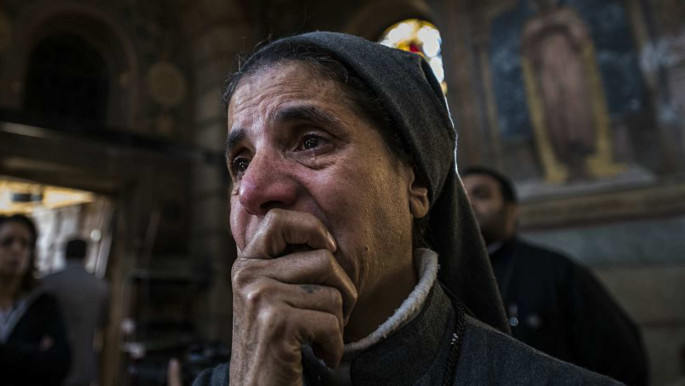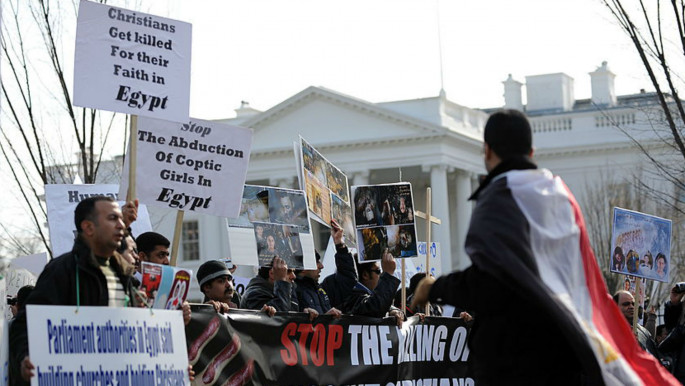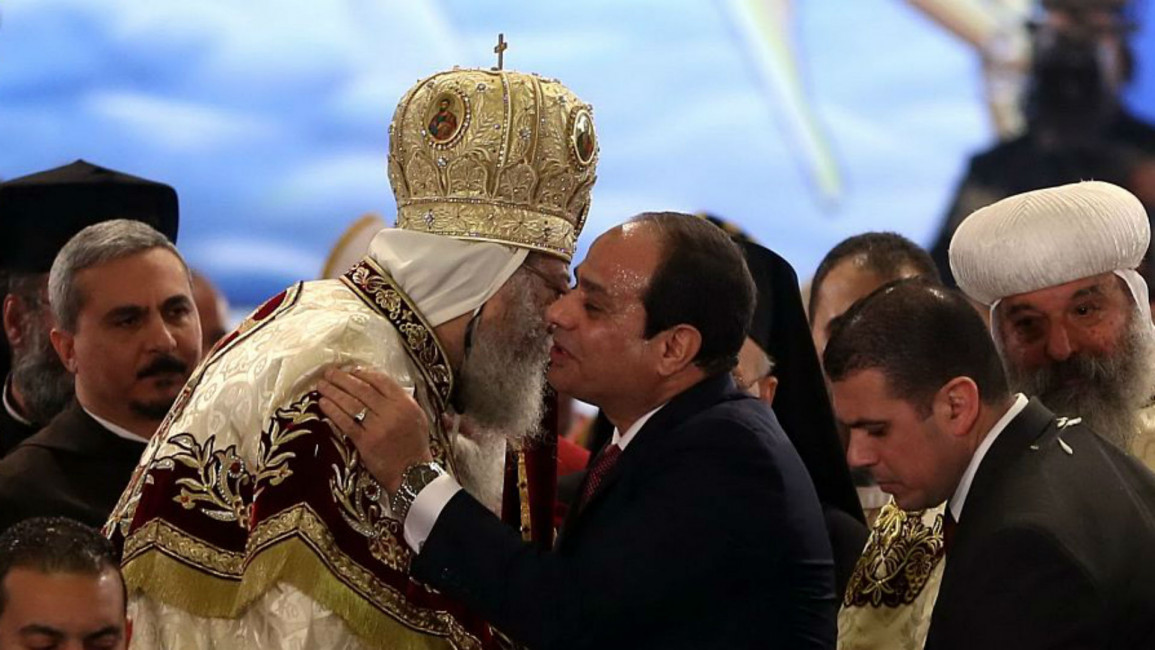
Sisi and Trump: What do Copts see in strongmen?
Sisi and Trump: What do Copts see in strongmen?
Comment: The Coptic community in both the US and Egypt has thrown its support behind authoritarian leaders, but at what price? asks Sam Fouad.
6 min read
President Sisi embraces Coptic Pope Tawadros during a celebration at a monastery in 2015 [Getty]
Relocating from an authoritative nation to an advanced democracy is no easy feat. There are language barriers, cultural differences, unfamiliar societal cues and questions of assimilation. These are all realisations that one must come to terms with upon arrival in America.
Leaving Egypt usually requires weathering the arduous process of obtaining legal means of emigration, which can sometimes include procuring proof of discrimination at home. Even so, the starkest difference may be the opportunity to participate in electing a president and a legislative body.
Being a Copt living in Egypt means being treated as a second-class citizen, running the risk of being harassed or attacked, and - along with all other Egyptians - not being able to truly participate in their governmental processes.
The Coptic community within Egypt is an ancient and resilient one. Having experienced centuries of discrimination at the hands of various parties, the Coptic diaspora has only begun to swell within the last few decades. America serves as the new home of a sizable portion of that diaspora.
As is common among all immigrants, they uprooted their lives, left family behind, and moved to America in the hopes of freedom and individuality. In many instances, America has given them that better life away from harassment, and sometimes, physical harm. America has also given them the right to vote in elections that matter.
The intersection between church and state is a fraught one, especially for those who come from nations where the survival of a minority can sometimes rely on a specific political party, or leader.
 |
Being a Copt living in Egypt means being treated as a second-class citizen, running the risk of being harassed or attacked, and – along with all other Egyptians – not being able to truly participate in their governmental processes |  |
 |
|
|
A Coptic nun witnesses the aftermath of a blast at Saint Peter and Saint Paul Coptic |
However, some leaders have treated Copts better than others. For instance, the military regime of Abdel Fattah al-Sisi, with all of its shortcomings (and there are many), treats Copts much better than Morsi's Muslim Brotherhood did.
In fact, the Brotherhood was actively attempting to diminish the Coptic church's role in Egyptian society.
All that said, some things never change. Even as Copts in America embrace and grow to love their adopted country, some politicians continue to use Middle Eastern minorities as political pawns.
As President Trump pushed an eerily familiar, sectarian narrative with his attempted Muslim bans, Middle Eastern minorities - especially Christians, or Copts - were used as a reason to promote this policy. Christians were reduced to a people who were merely getting their heads chopped off; an insulting attempt at garnering support for a bigoted measure.
Even though this political maneuvre was a weak attempt at
 |
|
|
Copts hold a rally outside The White House |
Coming from a region that never talks about its own record of minority rights, hearing a candidate articulate their main concern was a giant step in the right direction; regardless of the sincerity of that statement. As a result, many in the American Coptic community voted for President Trump in the hope that he would lead a much-needed discussion about the fate of minorities in the Middle East and be a voice for the voiceless.
However, as is typical of President Trump, the only things that he can be counted on for are incompetence and broken promises. Quickly dispelling all notions of care or sincerity, he strengthened the jurisdiction of immigration and customs enforcement, and had a group of Chaldean Christians rounded up in their church in Detroit and threatened with deportation back to IS-controlled territory in Iraq.
While their fate hangs in the decision of the court, this anecdote swiftly confirmed what some feared: The negligence and carelessness with which Middle Eastern minorities are perceived in their home countries would continue in today's America.
 |
Many in the American Coptic community voted for President Trump in the hopes that he would lead a much-needed discussion about the fate of minorities |  |
What Copts, and minority groups at large want, is to be treated as equal to others in their homeland. Those in the diaspora want leaders to be aware of this injustice and act accordingly to change it. Being the powerful nation that it is, many American Copts look towards their American leaders to be catalysts for change, as those in Egypt look towards their Egyptian leaders.
As expected, more hope is placed at the feet of American leaders than those who run Arab dictatorships, military or otherwise.
As expected, more hope is placed at the feet of American leaders than those who run Arab dictatorships, military or otherwise.
The large support for Trump from many of these immigrant, minority populations matches what has been a common denominator for his support from people from all walks of life: He says it like it is.
| Read more: Sisi's failed police state must answer for church bombings | |
Much can be said of the desperation of marginalised communities. The voiceless have always looked for a voice that has their best interests in mind. They have always looked for someone with influence and power to work on their behalf.
Although everyone knew that Trump was not the most eloquent or measured man, he was someone who enunciated the existence of a problem that everyone else glossed over. While everyone acknowledges the horrors of IS, few in a position of power are willing to focus on the plight of the persecuted minority.
Perhaps the greatest tragedy of this predicament is that the man the diasporic community was willing to put their faith in turned out to be exactly what those were paying close attention always knew him to be: a callous, unconcerned con-man. As a growing American community slowly realize that they’ve placed their hopes in the wrong person, they cannot be faulted for their optimism. At least now, their main concern has a place on the table of national discourse.
Sam Fouad is a political consultant and a global affairs analyst based in Washington, DC. You can follow him on Twitter @_saf155
Opinions expressed in this article remain those of the author, and do not necessarily represent those of The New Arab, its editorial board or staff.
Opinions expressed in this article remain those of the author, and do not necessarily represent those of The New Arab, its editorial board or staff.




